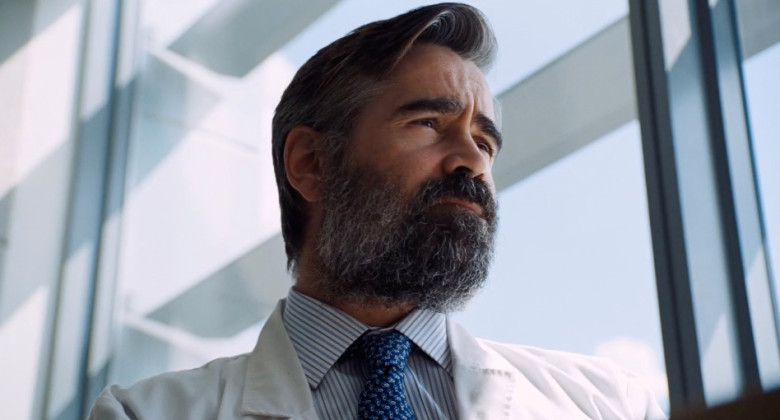
As unforgettable as it is unshakable, the fifth film from Greek filmmaker Yorgos Lanthimos (Dogtooth, The Lobster), The Killing of a Sacred Deer, is an unsettling and transgressive domestic odyssey that astounds with its unrelenting menace and imaginative fluency.
Equal parts garish and gorgeous, this incendiary psychodrama tells the undone tale of renowned cardiovascular surgeon and recovering alcoholic Dr. Steven Murphy (Colin Farrell, excellent), overseer of an affluent home with a flawless family; a beautiful wife Anna (Nicole Kidman), also a medical professional; their 12-year-old son, Bob (Sunny Suljic); their 14-year-old daughter, Kim (Raffey Cassidy), even a spry pet dog.
Soon their pastoral idyll is disrupted by the presence of Martin (a creepy AF Barry Keoghan, channeling both Holden Caulfield and Alex Delarge), a 16-year-old friend and patient of Steven’s, with an unfortunate past that binds the two and will inevitably link their atrocious futures as well.
The Killing of a Sacred Deer has surrealist dips and dervishes, almost like a Buñuel picture, particularly when you consider that Martin and his rueful mother (Alicia Silverstone) seem to represent a petit bourgeois behaviorism that is offset by the Murphy’s privileged long green. But, as with Lanthimos’ previous films, here there is a cool down to any hypnagogic flights of fancy due to all manner of naturalistic approaches, such as the natural, high contrast lighting, and use of sound, often adding and amping up a voyeuristic quality to the macabre progression.
From the opening closeup shot of an open heart surgery through to a decidedly dour family dinner in a diner in the final reel, there’s never any doubt that we’re watching a Lanthimos movie as his technical mastery is evident in the fluid and very formal camerawork –– he’s once again partnered with his regular cinematographer Thimios Bakatakis –– as well as in the very deliberate and occasionally stilted dialogue, which has a particular down tempo doggerel to it.
Lanthimos and his incredibly gifted cast (standouts include Cassidy’s lovestruck teen, and the always bringing her A-game Kidman) have a way of making the film’s unconventional narrative strategies work with astonishing, and at times blistering force.
As Steven’s children begin to experience atrophy in their lower extremities it becomes obvious that Martin’s off-putting eccentricities might amount to something sinister and annihilative, as he no doubt must be behind it. Smartly, there’s an absurdist though very discomfiting sense of humor at play here, too –– though I must admit it’s been quite some time since I’ve been in a packed theater with quite so much jittery and uncomfortable laughter as this –– and it makes for an effective if unwieldy anecdotal device.
As The Killing of a Sacred Deer lurches forward, the evocative and poetic study of revenge that it conjures brazenly suggests that we, as witnesses, are the quarry just as much as the star-crossed Murphy ménage, and we are left with a meditative nightmare of kink and kin.
Love him or hate him, and like all his films, Lanthimos’ latest will no doubt be praised, puzzled over, celebrated and condemned, what cannot be brushed aside is that he’s an auteur of considerable, and discernable craft with a commanding vision. This is a full-on horror film, make no mistake, but it’s also a bitter and jet-black masterpiece, as well.
Taste of Cinema Rating: 4.5 stars (out of 5)
Author Bio: Shane Scott-Travis is a film critic, screenwriter, comic book author/illustrator and cineaste. Currently residing in Vancouver, Canada, Shane can often be found at the cinema, the dog park, or off in a corner someplace, paraphrasing Groucho Marx. Follow Shane on Twitter @ShaneScottravis.